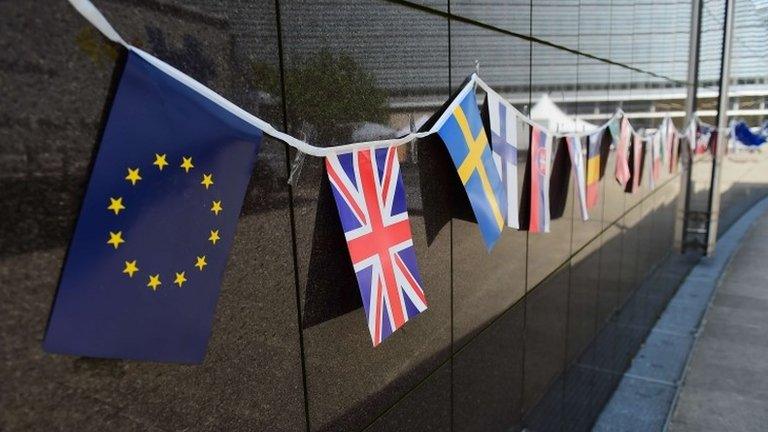Boris Johnson backs EU referendum freedom for ministers
- Published
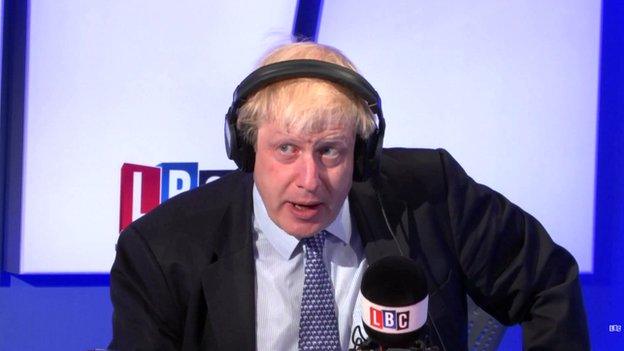
Ministers should be allowed to campaign to leave the EU in the upcoming referendum, Boris Johnson has said.
The London mayor said it would be "safer and more harmonious" for David Cameron to give ministers free rein.
His comments come amid Conservative tensions over whether ministers would lose their jobs if they campaign for an exit, against the PM's recommendation.
MPs are currently debating the bill paving the way for an in/out EU referendum for the first time.
Follow the EU Referendum Bill debate live
The EU Referendum Bill, which would authorise a referendum before the end of 2017, is expected to pass comfortably at second reading, its first legislative hurdle in Parliament.
Mr Johnson's comments came on the day David Cameron faced headlines accusing him of a U-turn after he claimed his comments suggesting ministers would have to back him on the EU vote or quit, were "misinterpreted".
He was forced to clarify his position after a number of former ministers expressed concerns that colleagues would have to leave the government if they wanted to make the case for leaving the EU during the forthcoming referendum.
'Make your minds up'
Asked for his thoughts during his weekly phone-in on LBC radio, Boris Johnson initially said it was a matter for the PM and the government to decide.
But when pressed further to say if ministers should be allowed to campaign for a British exit against the PM's recommendation, he said: "I don't see why not."
This "seemed to work" during the 1975 EU referendum, when cabinet ministers were able to campaign on conscience rather than party line, he said.
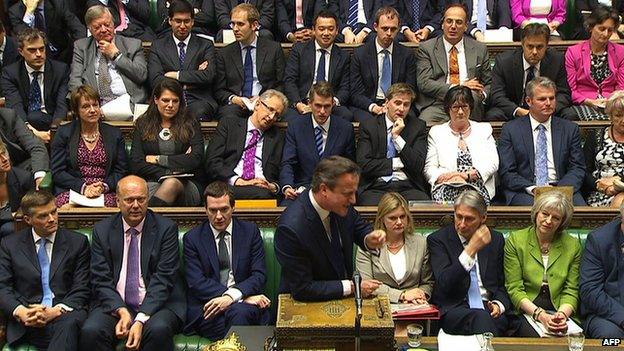
David Cameron has said he wants the UK to stay in a reformed European Union
Mr Johnson said: "Just thinking about it out loud I think it would probably be safer and more harmonious just to say [to ministers] 'OK, make your minds up'.
"On something like this do you really need to bind everyone in?"
The Uxbridge and Ruislip MP added that he thought David Cameron would have support from the "overwhelming majority" of Conservative colleagues if he secured the EU reforms he is after.
But he also restated that the UK should be prepared to walk away from the European Union if sufficient change could not be achieved.
Shadow foreign secretary Hilary Benn said the PM had created "utter confusion" with his comments and asked his government counterpart, Philip Hammond, for clarity on the principle of collective responsibility when it comes to the EU referendum.
Mr Hammond said all ministers were signed up to the government's renegotiation strategy but told MPs it would be "simply hypothetical" to talk about who could do what until the outcome of EU talks have concluded.
'Vote by 2017'
Mr Cameron's plan is to renegotiate the UK's relationship with the EU ahead of the in/out vote, with voters being asked "Should the UK remain a member of the European Union?"
He says he is confident of securing the changes he wants so he can push for a Yes vote to stay in Europe, but says he "rules nothing out" if his demands to EU leaders on issues such as immigration, welfare, national sovereignty and further integration are rejected.

EU referendum in focus
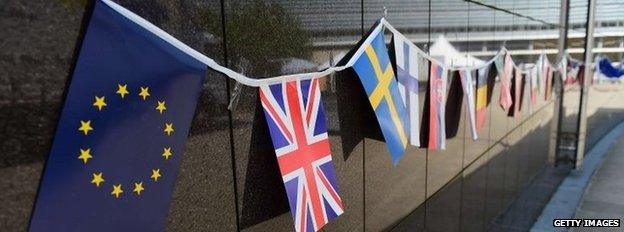
David Cameron is starting renegotiation of the terms of Britain's EU membership ahead of a referendum. Here is some further reading on what it all means:
Q&A: The UK's planned EU referendum
UK and the EU: Better off out or in?
What Britain wants from Europe

The bill proposes staging the referendum on the same electoral franchise as UK general elections, although peers and Commonwealth citizens living in Gibraltar would also be permitted to vote.
Labour, which previously opposed a referendum, said recently it would back the bill although it - and the Lib Dems - are expected to try to make changes to the legislation, including extending the vote to 16 and 17 year-olds.
Lib Dem peer Lord Steel, who was part of the Yes campaign in the 1975 EU referendum, told BBC Radio 4's Today programme that if the change could not be achieved in the Commons it "certainly will" in the House of Lords - where the Conservatives do not have a majority.
The SNP opposes the bill because it does not include a "double majority" which would ensure that Britain could only exit the EU if all four nations voted in favour.
The nationalists are also aggrieved that 16 and 17-year-olds will not be allowed to vote in the poll, and they do not want the date of the referendum to coincide with Scottish, Welsh or Northern Ireland elections in May 2016.
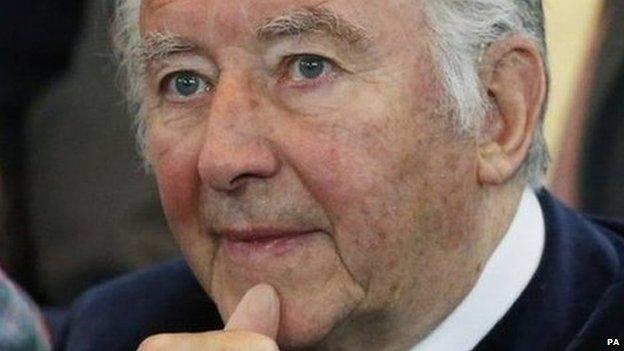
Lord Steel indicated that the House of Lords would amend the bill to give 16 and 17-year-olds the vote
The SNP has tabled an amendment - supported by two smaller opposition parties - declining to give the bill a second reading. It will be up to the Speaker to decide whether to select it for debate.
The SNP's Patrick Grady said the bill did not meet the "gold standards of the Scottish referendum on inclusivity and participation" and risked a situation where Scotland could be taken out of the EU "against its own will".
But Conservative MP John Redwood said this was a decision for the UK as a whole, telling the BBC that "this is not the time to try and split up the union by the backdoor".
The legislation must be approved by both the Commons and the Lords, which is regarded as a virtual certainty after the Conservatives' election victory. But the speed with which it moves through Parliament could be a factor in influencing when the vote is held.
Mr Cameron has said he would like to hold it earlier than the end of 2017 and some within the party are pushing for a poll as early as May 2016 but other Tories oppose this as do Labour.
Ahead of the debate, an influential think tank which campaigns for reform within the EU called for 11 major changes to make the 28-member body more flexible and competitive.
Open Europe says national parliaments should be able to block EU legislation through a "red card" system, restrict access to welfare to established residents, overhaul the EU budget and return control of justice and home affairs to member states.
- Published8 June 2015
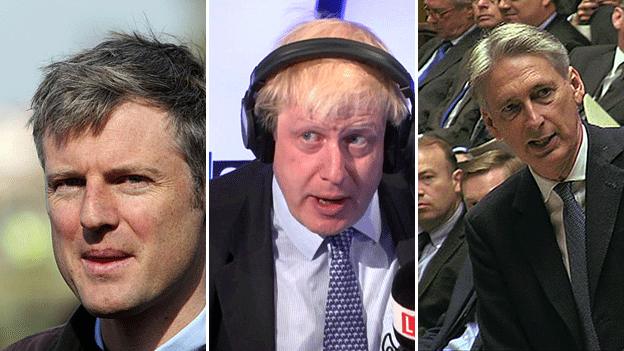
- Published8 June 2015
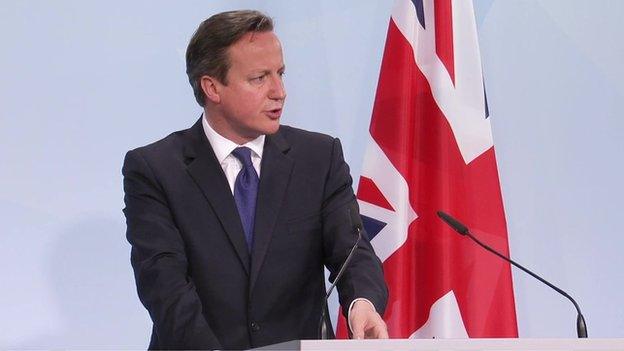
- Published8 June 2015
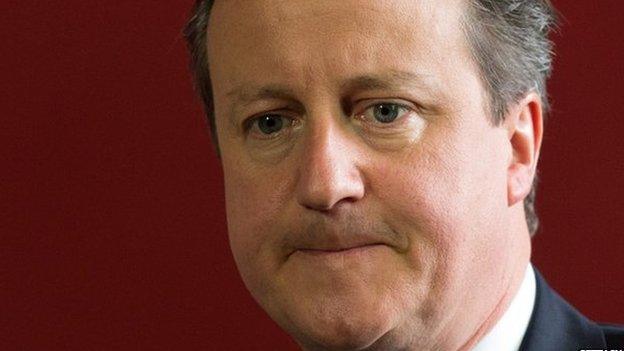
- Published8 June 2015
- Published30 December 2020

- Published17 February 2016
